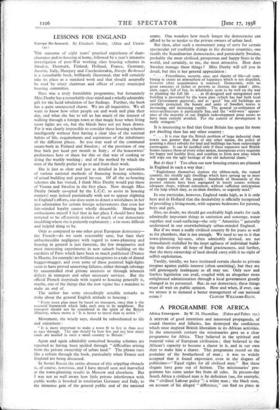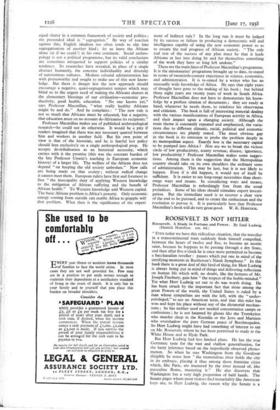A PROGRAMME_ FOR AFRICA
Africa Emergent. By W. M. Macmillan. (Faber and Faber. 5s.)
A MIXTURE of good intentions and- interested piopaganda, of sound theories and fallacies, has destroyed the confidence which once inspired British liberalism in its African activities. In the nineteenth century the missionaries gave us a clear programme for Africa. They belieiied in the spiritual and material value of European civilisation ; they believed in the African's capacity to become a sharer in it, and in our own duty to make him a sharer. This programme rested on the postulate of the brotherhood of man ; it was so widely accepted that it found expression even in the' slogans of politicians—" Equal rights for all civilised men." But these slogans have gone out of fashion. The missionaries' pro- gramme has come under fire from all sides. In present-day South Africa a civilised man is by definition (see, for example, the "civilised Labour policy ") a white man;; -the black man,, on account of his alleged " difference," can find no place as
equal sharer in a common framework of society and politics ; the pretended ideal is " segregation." By way of reaction against this, English idealism too often tends to slip into segregationism of another kind ; let us leave the African alone (as if we could !) in his own continent. Social anthro- pology is not a political programme, but its valid conclusions are sometimes misquoted to support policies of a similar tendency. Its researches have revealed, in place of a single abstract humanity, the concrete individuality and diversity of autonomous cultures. Modern colonial administration has with praiseworthy zeal sought to make use of this new know- ledge. But there is danger lest the new approach should encourage a negative, quasi-segregationist temper which may blind us to the urgent need of making the Africans sharers in the elementary blessings of our civilisation—economic pro- ductivity, good health, education. " No one knows yet," says Professor Macmillan, " what really healthy Africans might be and do." And he complains : " The new rule is not so much that Africans must be educated, but a negative, that education must on no account de-Africanise its recipients."
Professor Macmillan makes use of published anthropological research—he could not do otherwise. It would be a pity if readers imagined that there was any necessary quarrel between him and workers in another field. But his own point of view is that of the historian, and he is fearful lest policy should lean exclusively on a single anthropological prop. He accepts de-tribalisation as an historical necessity, which carries with it the promise (this was the constant burden of the late Professor Unwin's teaching in European economic history) of a larger life. The welfare of the African does not depend " on keeping the old society unbroken." New calls are being made on that society ; without radical change it cannot meet them. European rulers have first and foremost to face " the inescapable duty of applying Western knowledge to the mitigation of African suffering and the benefit of African health." To Western knowledge add Western capital. The basic African problem is Africa's poverty. Only economic energy coming from outside can. enable Africa to grapple witl that problem. What then is the significance of the experi-
ment of indirect rule? In the long run it must be judged by its success or failure in producing a democratic will and intelligence capable of using the new economic power so as to ensure the real progress of African society. " The only real test of the success of any plan must be that it leads Africans at last into doing by and for themselves something of the work they have so long left undone."
These are the main lines of Professor Macmillan's programme. It is the missionaries' programme brought up to date, re-stated in terms of twentieth-century experience in science, economics, and administration. It is re-stated by a writer who has an unusually wide knowledge of Africa. He says that eight years of thought have gone to the making of his book ; but behind those eight years are twenty years of work in South Africa. Professor Macmillan does not have to demonstrate his know- ledge by a profuse citation of documents ; they are ready at hand, whenever he needs them, to reinforce his observation and criticism. The book is full of interesting material dealing with the various manifestations of European activity in Africa, and their impact upon a changing society. Although the main theme is constantly repeated and emphasised, the varia- tions due to different climatic, racial, political and economic circumstances are plainly stated. . The most obvious gap in the book is its omission to probe the problem deeply in its metropolitan aspect. Exactly how is the necessary capital to be pumped into Africa ? How are we to break the vicious circle of low productivity, scanty revenue, disease, ignorance, low productivity ? Professor Macmillan makes some sugges- tions. Among them is the suggestion that the Metropolitan country should take on its own shoulders the ordinary costs of administration. This may be just, but it is not likely to happen. Even if it did happen, it would not of itself be sufficient. It is easier to see long-range necessities than short- range ways and means. In considering ways and means, Professor Macmillan is refreshingly free from the usual prejudices. Some of his ideas should stimulate expert investi- gation. But the immediate need is to recover a clear view of the end to be pursued, and to create the enthusiasm and the resolution to pursue it. It is particularly here that Professor Macmillan's book will do very great good. W. K. HANCOCIL



















































 Previous page
Previous page